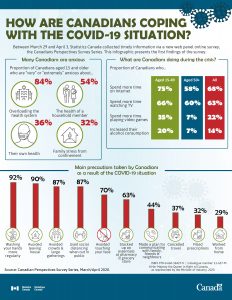
Sedentary behavior patterns and adiposity in children: a study based on compositional data analysis
April 3, 2020
The time for pandemic uprising is here – let gravity be your friend!
April 15, 2020Today’s post comes from Dr. Scott Rollo, a postdoctoral fellow at the Children’s Hospital of Eastern Ontario (CHEO) Research Institute. More on Scott can be found at the bottom of this post.
In response to the COVID-19 pandemic, Statistics Canada launched a new online survey, the ‘Canadians Perspectives Survey Series’, to collect timely information regarding how Canadians are coping with the COVID-19 situation. Using data collected between March 29th and April 3rd, preliminary findings of the survey indicate elevated levels of anxiety, changes in daily activities, and a number of precautions being taken by Canadians.
Canadians reported taking several precautions as a result of the COVID-19 situation – the most common of which being washing our hands more regularly (92%), avoiding leaving our houses (90%), avoiding crowds and large gatherings (87%), and practicing social distancing in public places (87%).1 For many, this crisis has brought forth changes to daily routines and impacted the way we live and work. Half of Canadians have been asked to transition out of the office and work from home.2 With strict physical distancing and community-based measures in place to hopefully limit the spread of COVID-19, the majority of Canadians (≥ 60%) report they have been spending more time using the Internet and watching TV during the crisis.1 This could be partially explained by several social activities being transitioned to online platforms, including education and learning, Zoom meetings and social gatherings, fitness classes, live concerts, dinner and drinks parties, and eSports competitions.2 It is likely that individuals are also spending more time in traditional screen-based pursuits like playing videogames, streaming TV/movies (e.g., Netflix), and social media use.
It appears these restrictions that are forcing many people indoors while helping to contain the spread of COVID-19 may be creating other mental and physical health issues because of increased sedentary and screen time. Large proportions of Canadians aged 15 and older reported that they feel “very” to “extremely” anxious about the possibility of overloading the health system (84%), their personal health (36%) and the health of family members (54%), as well as family stress from confinement (32%).1 In another survey of 1,515 Canadian adults conducted by Maru/Blue – a quality panel and data service insights firm – it was found that 4 in 5 Canadians are feeling negative emotions (e.g., concern, worry, anxiety) and that they continue to be concerned about the social impact of COVID-19 and the physical health of loved ones.2 Concern and uncertainty surrounding how long the crisis will last (1 in 5 believe it will last as least another 6 months) and the lasting economic impact that will result (75% believe the impact will be felt for ≥2-3 years) is evident.2
In difficult and uncertain times like these, it is perhaps more important than ever to limit our sedentary and screen time, and find ways to be physically active to maintain our physical and emotional health.
An infographic that presents the first findings of this Stats Can survey can be found below and/or accessed at: https://www150.statcan.gc.ca/n1/pub/11-627-m/11-627-m2020029-eng.htm

Sources:
1Statistics Canada. Canadian Perspectives Survey Series, March/April 2020. Released April 8, 2020.
2Maru/Blue. Emotional state of the country. Released April, 2020.
Dr. Scott Rollo is currently a postdoctoral fellow with the Healthy Active Living and Obesity (HALO) research group at the CHEO Research Institute working with Dr. Mark Tremblay. His research focus is on 24-hr movement behaviours & paediatric health. Scott completed his PhD in the Exercise & Health Psychology Laboratory at Western University conducting theory-driven health behaviour change & behavioural medicine research under Dr. Harry Prapavessis’ supervision.





